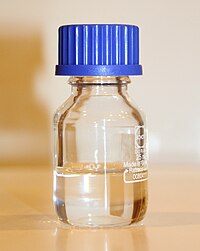
Photo from wikipedia
Platinum nanoparticles were electrochemically deposited on conducting polymer polythiophene (PTh)-coated stainless steel (SS) substrate. A thin layer of PTh on the steel substrate facilitates uniform deposition of Pt nanoparticles on… Click to show full abstract
Platinum nanoparticles were electrochemically deposited on conducting polymer polythiophene (PTh)-coated stainless steel (SS) substrate. A thin layer of PTh on the steel substrate facilitates uniform deposition of Pt nanoparticles on the substrate, thereby improving the surface area to a great extent. The electrochemical properties of the modified electrodes were analyzed by cyclic voltammetry (CV) and electrochemical impedance spectroscopy (EIS). The physicochemical properties of the modified electrodes were investigated by Scanning electron microscopy (SEM), Transmission electron microscopy (TEM), X-ray diffraction spectroscopy (XRD), Raman spectroscopy, and Fourier transform infrared spectroscopy (FTIR). The proposed method has been applied for the electrocatalytic oxidation of benzyl alcohol in the presence of a mediator, 2,2,6,6-tetramethylpiperidine 1-oxyl (TEMPO). Cyclic voltammetric studies reveal that the electrocatalytic activity of Pt–PTh/SS electrode is higher than that of PTh/SS electrode toward the conversion of benzyl alcohol to benzaldehyde.
Journal Title: Journal of Applied Electrochemistry
Year Published: 2019
Link to full text (if available)
Share on Social Media: Sign Up to like & get
recommendations!